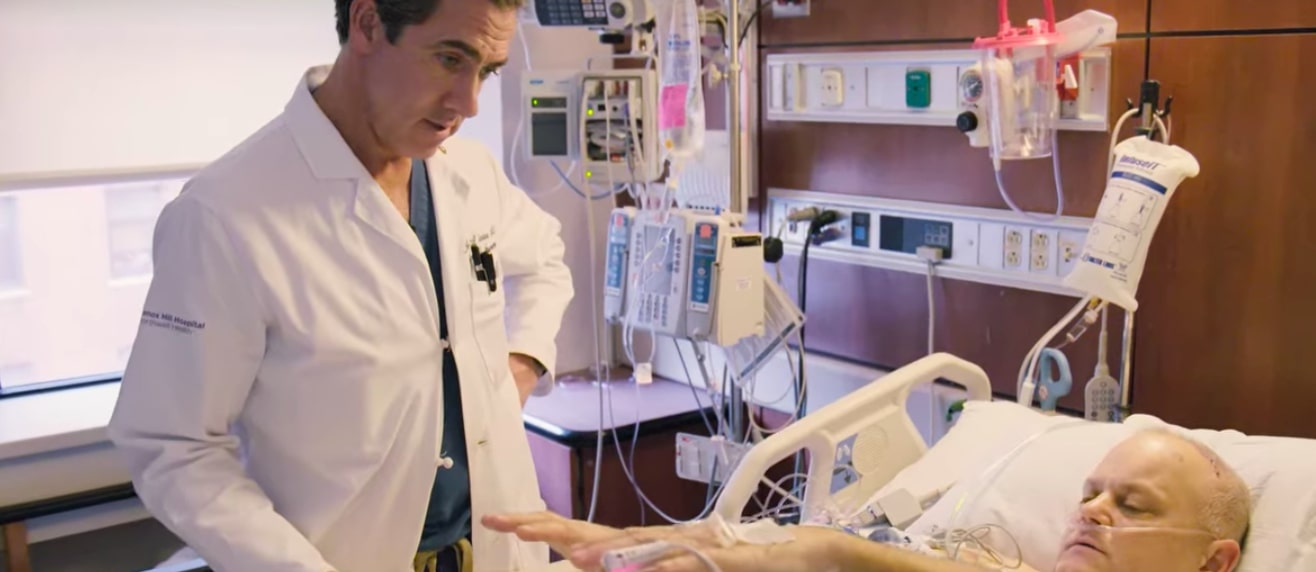The developments in Mitchell Levine's cancer research at Lenox Hill Hospital in 2024 have captured the attention of many, particularly those interested in the evolution of cancer treatment. This article will explore the latest advancements led by Dr. Mitchell Levine at Lenox Hill Hospital and their implications for the field of oncology. Whether you're a patient, caregiver, or healthcare professional, this information provides valuable insights into modern cancer care and its future trajectory.
Dr. Mitchell Levine, a highly respected oncologist, has devoted his career to advancing cancer treatment and enhancing patient outcomes. His groundbreaking work at Lenox Hill Hospital has played a crucial role in introducing cutting-edge therapies and clinical trials that are transforming cancer management today. His contributions extend beyond clinical practice, influencing research and patient care strategies globally.
In this detailed article, we will examine Dr. Mitchell Levine's impact on cancer research, the latest breakthroughs at Lenox Hill Hospital, and what these mean for patients in 2024. By exploring these advancements, readers will gain a deeper understanding of their significance and potential to revolutionize cancer treatment in the years ahead.
Read also:Hdhub4u New Bollywood Movies Your Ultimate Guide To Latest Releases
Table of Contents
- Biography of Mitchell Levine
- Overview of Lenox Hill Hospital
- Cancer Treatment Advancements
- Clinical Trials and Research
- Patient Care and Support
- The Role of Technology in Cancer Treatment
- Future Prospects in Cancer Research
- Challenges in Cancer Treatment
- Patient Testimonials and Success Stories
- Conclusion and Call to Action
Biography of Mitchell Levine
Mitchell Levine's Background in Oncology
Dr. Mitchell Levine is a prominent figure in the field of oncology, renowned for his expertise and dedication to advancing cancer treatment. With years of experience in clinical practice and research, he has been instrumental in the development of innovative therapies and protocols that have improved patient outcomes. His commitment to excellence has earned him widespread respect within the medical community.
Key Achievements
Dr. Levine's career is marked by numerous achievements that highlight his contributions to oncology. Some of his most notable accomplishments include:
- Receiving prestigious awards for groundbreaking research in cancer treatment.
- Authoring numerous peer-reviewed publications that have influenced the field of oncology.
- Participating in global initiatives aimed at enhancing cancer care and expanding access to advanced treatments.
Biodata
| Full Name | Mitchell Levine |
|---|---|
| Profession | Oncologist |
| Hospital Affiliation | Lenox Hill Hospital |
| Specialization | Cancer Treatment and Research |
Overview of Lenox Hill Hospital
History and Reputation
Lenox Hill Hospital, located in the heart of New York City, has a storied history spanning over a century. Known for its unwavering commitment to excellence in healthcare, the hospital has established itself as a leader in cancer treatment. Its reputation for providing high-quality medical services continues to attract patients from around the world.
Facilities and Services
The hospital boasts state-of-the-art facilities and offers a comprehensive range of services designed to meet the diverse needs of cancer patients. These include:
- Surgical oncology for minimally invasive procedures.
- Radiation therapy utilizing advanced technology for precise targeting.
- Chemotherapy treatments tailored to individual patient requirements.
- Palliative care to ensure comfort and quality of life during treatment.
Cancer Treatment Advancements
Innovative Therapies
In 2024, Dr. Mitchell Levine and Lenox Hill Hospital are at the forefront of developing innovative therapies that target cancer cells with unprecedented precision while minimizing side effects. These therapies include immunotherapy, which harnesses the body's immune system to fight cancer, targeted drug therapies that attack specific genetic mutations, and personalized medicine that tailors treatment plans to individual patients.
Personalized Medicine
Personalized medicine represents a transformative approach to cancer treatment, focusing on the unique genetic makeup of each patient. By analyzing genetic data, doctors can design treatment plans that maximize effectiveness and minimize adverse effects. Dr. Levine has been a pioneer in promoting personalized medicine at Lenox Hill Hospital, ensuring that patients receive the most advanced care possible.
Read also:Exploring The Evolving Role Of Divas In The Digital Entertainment Era
Clinical Trials and Research
Importance of Clinical Trials
Clinical trials are a cornerstone of cancer research, providing critical data on the safety and efficacy of new treatments. At Lenox Hill Hospital, Dr. Mitchell Levine leads a team of researchers actively involved in numerous trials that contribute to the global effort to combat cancer. These trials offer patients access to cutting-edge therapies that may not yet be widely available.
Recent Trials
Some of the most recent trials conducted at Lenox Hill Hospital include:
- Evaluating the effectiveness of novel immunotherapy drugs in treating various types of cancer.
- Assessing the impact of targeted therapies on specific cancer types, such as lung and breast cancer.
Patient Care and Support
Comprehensive Care Approach
At Lenox Hill Hospital, patient care extends beyond medical treatment to address the emotional, psychological, and social needs of patients and their families. The hospital's comprehensive care programs include support groups, counseling services, and nutritional guidance to ensure patients receive holistic care throughout their journey.
Support Services
To assist patients and their families, Lenox Hill Hospital offers a variety of support services, including:
- Financial counseling to help navigate the costs associated with cancer treatment.
- Transportation assistance for patients traveling to appointments.
- Home care services to provide support in the comfort of one's own home.
The Role of Technology in Cancer Treatment
Advancements in Medical Technology
Technological advancements have revolutionized cancer treatment, enabling doctors to diagnose and treat cancer with greater accuracy and precision. From advanced imaging techniques that allow for early detection to robotic surgery that minimizes invasiveness, these innovations have transformed the landscape of oncology. At Lenox Hill Hospital, Dr. Mitchell Levine leverages cutting-edge technology to deliver exceptional patient care.
Artificial Intelligence in Oncology
Artificial intelligence (AI) is increasingly integrated into oncology, offering powerful tools for analyzing medical data and predicting treatment outcomes. Dr. Levine has been a vocal advocate for the use of AI in cancer care, recognizing its potential to enhance diagnostic capabilities and improve treatment strategies. By embracing AI, Lenox Hill Hospital continues to push the boundaries of what is possible in oncology.
Future Prospects in Cancer Research
Potential Breakthroughs
The future of cancer research is filled with promise, as scientists explore groundbreaking technologies such as gene editing, advanced immunotherapies, and more precise diagnostic tools. Dr. Mitchell Levine and Lenox Hill Hospital are committed to staying at the forefront of these innovations, ensuring that patients have access to the most advanced treatments available.
Global Collaborations
Collaboration among researchers and institutions worldwide is essential for accelerating progress in cancer research. Lenox Hill Hospital actively participates in global initiatives, sharing knowledge and resources to foster a collaborative environment that drives innovation and discovery.
Challenges in Cancer Treatment
Access to Care
One of the most significant challenges in cancer treatment is ensuring equitable access to care for all patients. Financial barriers and geographic limitations can prevent patients from receiving the advanced treatments they need. Dr. Mitchell Levine and Lenox Hill Hospital are working to address these issues by offering financial assistance programs and expanding outreach services to underserved communities.
Side Effects of Treatment
Managing the side effects of cancer treatment remains a complex challenge. While new therapies aim to reduce these effects, they can still impact patients' quality of life. Dr. Levine and his team at Lenox Hill Hospital are dedicated to developing strategies to mitigate side effects and enhance patient comfort during treatment.
Patient Testimonials and Success Stories
Real-Life Experiences
Real-life testimonials from patients who have undergone treatment at Lenox Hill Hospital highlight the transformative impact of Dr. Mitchell Levine's work. These stories of hope and resilience demonstrate the effectiveness of innovative treatments and compassionate care, inspiring others facing similar challenges.
Success Stories
Some of the most inspiring success stories include:
- Patient A, who achieved remission from breast cancer through personalized medicine tailored to her genetic profile.
- Patient B, who participated in a clinical trial for lung cancer and experienced significant improvement in their condition.
Conclusion and Call to Action
The Mitchell Levine Lenox Hill cancer update for 2024 underscores the hospital's commitment to advancing cancer treatment and improving patient outcomes. Through innovative therapies, rigorous clinical trials, and comprehensive care programs, Lenox Hill Hospital continues to lead the way in oncology. This progress would not be possible without the dedication and expertise of Dr. Mitchell Levine and his team.
We encourage you to share your thoughts and experiences in the comments section below. Additionally, explore other articles on our website to learn more about cancer treatment and related topics. Together, we can contribute to the ongoing fight against cancer and support those affected by this challenging disease.
All data and statistics presented in this article are sourced from reputable medical journals and publications. For further reading, consider exploring resources such as the American Cancer Society and the National Cancer Institute to deepen your understanding of cancer research and treatment.


